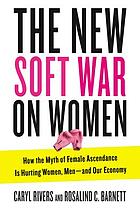A few weeks ago, I was sent a review copy of Caryl Rivers and Rosalind Barnett's latest collaboration, The New Soft War on Women: How the Myth of Female Ascendance is Hurting Women, Men - and Our Economy (Tarcher Penguin, 2013). I have read and appreciated the work of Rivers and Barnett before: their previous work has drawn on the latest in social science and psychological research to refute cultural narratives of gender difference that hurt us as children and as adults. This latest work treads little new ground. Rather, The New Soft War reminds us what we know (thanks to the research) about the continuing, pernicious discrimination against women in the high-powered workplace.
Such quantitative and qualitative research data run counter to recent anecdotal narratives (e.g. Hanna Rosin's The End of Men) that predict in near-hysterical terms a present or future of gender imbalance in which domineering women run the world while emasculated men creep away into the shadows to nurse their wounds. Instead of "female ascendance," Rivers and Burnett argue, female white-collar workers (virtually all of their examples come from the fields of business, finance, law, and corporate media, with a smattering of academics thrown in for good measure) continue to face gender stereotypes that impede their ability to succeed in their careers -- while the gender stereotypes their male counterparts experience often boost their success out of proportion to their proven abilities. Individual mentoring programs and other exhortations for women to self-advocate (the "lean in" approach) fail, the authors argue, because placing the burden for change on professional women themselves ignores cultural biases and structural disadvantages that conspire to make many individual opportunities a no-win situation if the individual in question is a woman rather than a man.
The book was a useful review of what the research tells us -- as far as it went. However, I found its overall narrative to be lacking in broader analysis and its ultimate conclusions (a reiteration of the need for systemic change, coupled with suggestions for how women can work within or game the current system) to be tepid. For two authors who have just spent over three hundred pages detailing how endemic sexism is in the white collar workplace, to have the final chapters focus largely on individual strategies would seem to undercut their argument for policy-level change.
I was also irritated by the focus on white collar professional women, most of whom were navigating a corporate culture I have little experience with and struggled to relate to. I would have appreciated a more class-inclusive approach: women working in less high-powered professions, including my own world of library science -- not to mention women working in the service and retail industries -- were barely mentioned. The focus was on women in traditionally male-dominated professions. Some of that data can no doubt be generalized to women in the workplace more generally, but I am wary of casually assuming that the experience of highly-educated (largely cis, het, white) professional-class women pulling down six-figure salaries can stand in for all of us.
Given, for example, the way recent scare stories about women dominating the new labor market often focus on working-class and poor women who are heads of household, it seems particularly important to push back against the notion that a first-generation female college graduate who earns a living wage as a pharmacist is "empowered" to the extent that she is immune from exploitation as a worker, sex discrimination as a woman, race discrimination if she is non-white, and ageism if this is a second career -- the list could go on and on. Rivers and Burnett rarely complicate their picture of the ideal worker with any of these intersectional concerns ... their analysis generally presumes a high-powered businesswoman who has learned (and is able) to play the corporate game, yet still finds herself passed over for a promotion, or condescended to after the birth of her first child.
In other words, a woman frustrated that all of her (acknowledged and unacknowledged) social privilege and personal gumption haven't rewarded her as lavishly as they have rewarded the men in her graduating class at Harvard Business School. This woman's concerns are not invalid ones -- it is fair to ask why our society rewards some groups of people more lavishly than others -- but the "new soft war on women" does not only affect her and her peers. It is part of an aggressive neo-capitalist campaign to dehumanize and disenfranchise employees and grant ever-more power to the plutocrat employers. Within this broader struggle between the (relatively) powerful and the (relatively) disempowered, gender discrimination is often but one of many battlegrounds. That Rivers and Burnett ignore this larger framework ultimately weakens their closing arguments for political and social change.
The kind of feminist analysis I appreciate most is the kind that does not ignore the complex differences that exist between women, but rather engages with them (even if only to say in one's introduction that a given study out of necessity will narrow its focus to X and Y group). The New Soft War would have been a better book, in my estimation, if it had at the very least acknowledged that its study population (and intended audience) was but one specific group of upper-middle-class professional women -- rather than women generally. And that its agenda for social change was one of limited reforms within the pre-existing system, rather than a more ambitious questioning of the economic status quo.

No comments:
Post a Comment